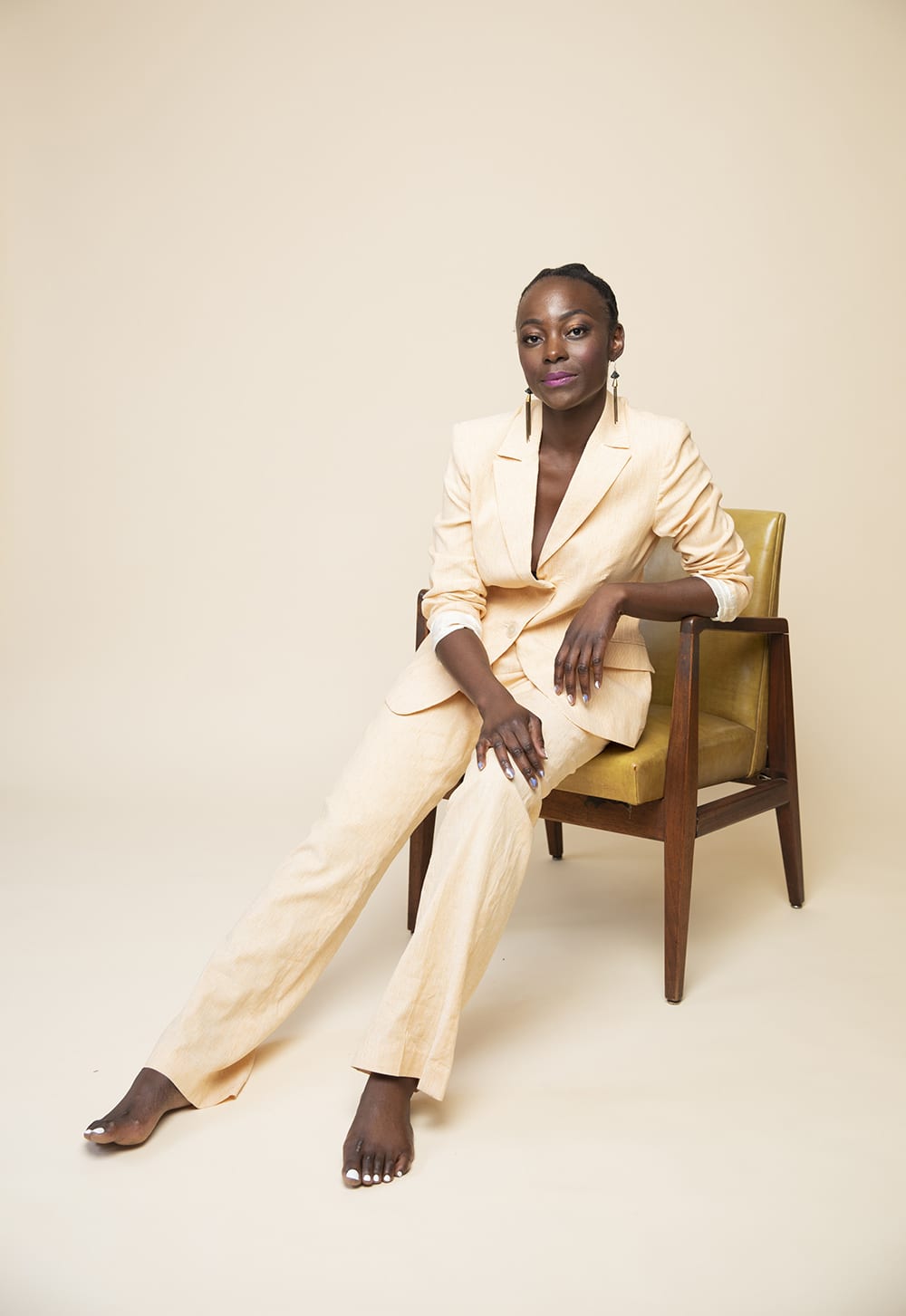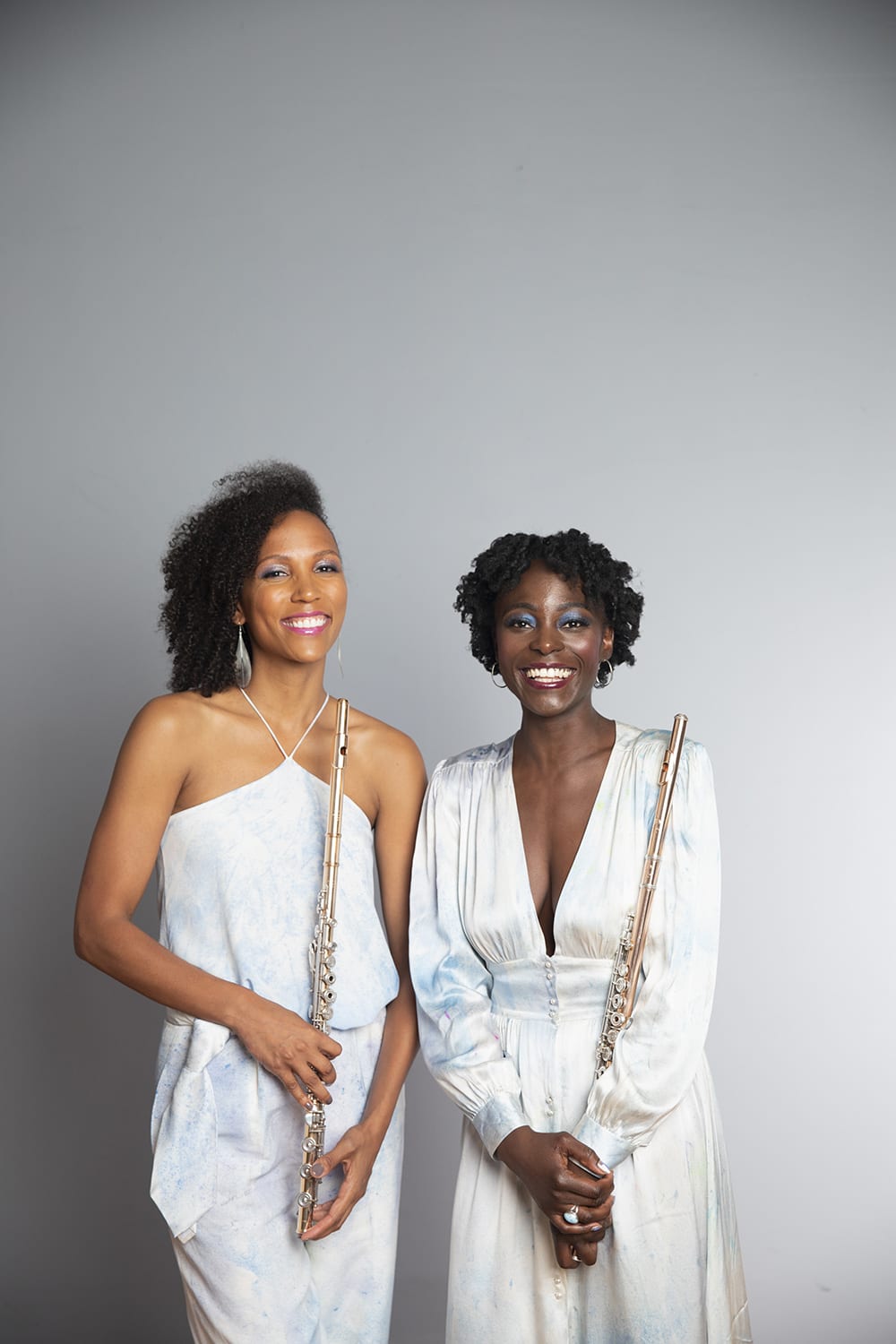Nathalie Joachim always loved music. She loved the records by popular Haitian singers like Emerante de Pradines Morse and Emeline Michel that her mom and dad would play around the house when she was growing up in Brooklyn. She loved the Haitian songs her grandma Ipheta taught her when she came to visit the family in America. And she loved the minuets she learned to plink out on the piano when she began taking lessons at age 4.
She would run home from school, drop her coat and bag on the floor, and sit on the piano bench and practice. And practice. She would spend hours basking in the exuberance of her sound. But there was one small problem: As far as technical proficiency goes, she was never very good at the piano. So, it was pure kismet when a visiting artist stopped by her school to demonstrate various orchestral instruments, and Nathalie was introduced to a magical cylindrical pipe that makes high-pitched sounds when air is blown through its mouthpiece. She picked up the flute for the first time at age 9 and has never put it down.
“Your daughter is very good,” said the band instructor at Nathalie’s elementary school. Her family had relocated to New Jersey, where there was a push to preserve band and orchestral instruction, which has been proven to build up the neural pathways linked with discipline, problem-solving, mathematical computation, focus, memory-building and language mastery. Nathalie’s parents agreed to allow her to take private flute lessons during her lunch break at school. Within a few months, the sacred name “Juilliard” began floating in the firmament.
Established in 1905, the Juilliard School, located in Manhattan’s Lincoln Center, is the most prestigious performing arts conservatory in America, on par with the top institutions in the world: The Royal Academy of Music in London, Conservatoire de Paris and the Moscow Imperial Conservatory in Russia. Three months after she first picked up the flute, 9-year-old Nathalie auditioned for Juilliard’s “Music Advancement Program,” a new initiative dedicated to making quality instruction available to youth from the New York area. Her acceptance into the program was nothing short of miraculous.

As an expert in style and music, Nathalie Joachim has been featured in several noteworthy magazines and television shows including Fudge, Telemundo, BK Live and The Daily Buzz. Photograph by Erin Patrice O’Brian.
Nathalie’s music studies rapidly intensified. She spent her Saturdays at Juilliard learning theory, ear training and ensemble performance techniques. A few days a week, she would take the bus into New York City for additional private flute instruction. She practiced every day, without fail, and never needed so much as a prompt from her mother. “My parents were always my biggest supporters and my biggest cheerleaders,” Nathalie Joachim recalls. “Yet I don’t think they could have navigated the path of a gifted child without the support of teachers who helped along the way. As immigrant parents, they always wanted me to be happy and successful, but in Haiti, music is not really something most people think of as a career option. It’s an integral part of the culture but not a typical profession. It wasn’t my parents’ original plan for me.”
But from her first professional performance at age 11, when she played among the hallowed acoustics of Avery Fisher Hall (home of the New York Philharmonic), Nathalie’s personal trajectory took aim at the great stages of the world, and she hurled herself toward this goal with complete abandon. Which isn’t to say that she neglected the signposts of teendom in America. She attended her classmates’ birthday parties. She joined the track team and the cheerleading squad. “I didn’t want to be seen as this special flute kid. I lived a dual life. When I was with my music peers in New York, it was one thing, and when I went home to New Jersey, it was another world. I wanted to have this sense of normalcy.”
One thing she did not do in high school was participate in band culture. “Starting from middle school, I convinced the administrators that I should get credit for being in band, but rather than attend rehearsals, I could use the time to practice on my own.” After all, she did have a lot of practicing to do for the Juilliard program and her continuing private lessons. And the music she was working on was far more complex than what her fellow high-schoolers were doing. She did, however, promise to perform with the band in all of their school concerts, which would anchor the wind instruments and ameliorate the band’s overall sound.
It was the type of resourceful win-win scenario that would come to characterize Nathalie’s journey in the world of music. For the hundreds of students who participate in Juilliard’s Music Advancement Program, the transition from high school to college is typically rocky. It’s the classic big fish, small pond scenario. You may have been the best musician at the school in your hometown, but suddenly, you’re forced into a big pond with the most elite musicians from around the world. And the acceptance rate for Juilliard’s undergraduate admissions is famously low, hovering around 5 percent.
But Nathalie breezed through the auditions and was one of two flutists selected among thousands of hopefuls. She was exactly the kind of talent that the Music Advancement Program had been designed to discover and develop, and, indeed, she was the first of its participants to make it from the Saturday youth program to the college division. Nathalie Joachim was exhilarated by the rigor of her studies at Juilliard, but as she navigated the elite training ground for the world’s most prominent orchestral musicians, she came across a serious roadblock: She had no interest in a career as an orchestral musician.
The love of music that bonded her to Grandma Ipheta and Haitian folkloric traditions had never left her soul. It had morphed into an unquenchable curiosity to explore new genres, like the hip hop and electronica scenes that were exploding in the late ’90s while Nathalie was in college. (Think Wu-Tang Clan, Erykah Badu, A Tribe Called Quest, The Roots, Björk, Roni Size, Tricky and Massive Attack.) Interdisciplinary collaboration became her mantra. She combined forces with innovative students in other disciplines—theatre and dance—and even organized a show with a student from NYU film school. Her Juilliard recitals became wildly popular events, so well-attended that the administration took notice—and shut her down.
Rigor was not the only foundational value at Juilliard; it was paired with its equally formidable sibling: tradition. Interdisciplinary collaboration was not part of the curriculum. Instead of trudging back to chamber music rehearsals sheepish and defeated, Nathalie marched into the office of Juilliard President Joseph Polisi to express her displeasure at being censured by the school. Polisi also was the child of immigrants, and his prodigious rise through the ranks at the Philharmonic to become the most powerful music educator in North America was the stuff of legend.

Flutronix, created by fellow flautist Allison Loggins-Hull (left) and Nathalie Joachim (right), is a groundbreaking musical duo that is re-defining and modernizing flute music and forging a path into the realm of the pop charts. Photograph by Erin Patrice O’Brian.
He wouldn’t be one to extinguish Nathalie’s entrepreneurial flame; in fact, he had the foresight to stoke it. “Is $2,000 enough?” Polisi asked while administering a payout that would finance Nathalie’s first professional venture—as both a musician and a producer. When Nathalie graduated from Juilliard, they created the “InterArts Award” in her name, to honor the interdisciplinary collaborative performances that she had become known for. The innovation and unbridled creativity that germinated in Nathalie’s soul at Juilliard blossomed over the past two decades into an acclaimed performance and teaching career. She toured the world as a featured instrumentalist with the award-winning, contemporary music ensembles Spektral Quartet and Eighth Blackbird.
She co-founded the eclectic duo Flutronix (with fellow virtuoso Allison Loggins-Hull), which has reinvented the meek flute as a tool for transcendent musicality. Above all, Nathalie Joachim is most proud of her 2019 album “Fanm d’Ayiti” (Women of Haiti), which garnered superstar status on Spotify, critical accolades in the press (The New York Times called it “powerful and unpretentious”) and a Grammy nod for Best World Music Album. “It was the first time in my career that I was able to stand in my full identity as a black woman, a Haitian-American, and a 21st Century artist. I found my own voice within the folkloric traditions of Haiti and how it connects with modern electronic music.”
Before recording the album, Nathalie spent two years traveling the Haitian countryside, visiting her parents’ hometown of Dantan and connecting with female Haitian artists along the way. “I put all of myself into that record,” recalls Nathalie. “I did all the writing and arranging in Creole, a language most people don’t interact with. To have it received by the general music public and the Haitian music public showed me that I can share my deepest self, and it will be accepted.” Although the Covid-19 pandemic has altered Nathalie’s upcoming performance and travel schedule, she has several projects on the calendar that will expand the process she pioneered with “Fanm d’Ayiti” of exploring folkloric musical traditions within the larger context of history and culture.
She has a mountain of commissions and collaborations in the works, including projects with Pulitzer Prize-winning violinist Caroline Shaw, the percussion quartet So Percussion, and the guitar ensemble Duo Noire. Regardless of who stands beside her on stage or in the studio, Nathalie Joachim recognizes that her greatest strength is the love of music and culture that was born years earlier in the company of Grandma Ipheta and rekindled by the women she met in the Haitian countryside. “We all shared this willingness to help others and a desire to scream from the mountaintops this pride we have as Haitian women. It has changed how I walk through the world and how I approach my art.”
Written by Karen Fragala Smith

